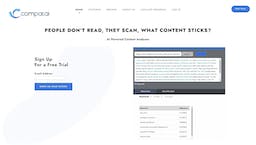User's Area

Compar
AI analyzing content to gain insights and trends.
What is Compar?
AI Powered Content Analysis
Content analysis powered by artificial intelligence (AI) is a method of examining and interpreting written, verbal, or visual content with the assistance of AI technologies. AI-powered content analysis uses machine learning algorithms and natural language processing to identify patterns, trends, and insights within the content. This approach enables businesses and researchers to extract valuable information and gain a deeper understanding of the content at a scale that would be impossible with manual analysis alone.
The Role of AI in Content Analysis
AI technologies play a crucial role in content analysis by automating the process of sifting through large volumes of content. With the use of AI, organizations can efficiently categorize, classify, and analyze content to uncover significant data points and trends. Additionally, AI-powered content analysis can be tailored to specific objectives, such as brand sentiment analysis, topic clustering, or keyword extraction. By leveraging AI, businesses gain the ability to quickly and accurately process vast amounts of content, leading to more informed decision-making and strategic insights.
Applications of AI-Powered Content Analysis
AI-powered content analysis finds applications across various industries, including marketing, finance, healthcare, and media. In the marketing sector, AI is used to analyze customer feedback, social media content, and market trends to shape targeted advertising campaigns and enhance customer engagement strategies. Financial institutions utilize AI-powered content analysis to assess market sentiment, analyze investment trends, and ensure compliance with regulatory requirements. In healthcare, AI technologies aid in extracting insights from medical research papers, patient records, and diagnostic imaging to support clinical decision-making and improve patient care.
Benefits of AI-Powered Content Analysis
The use of AI-powered content analysis offers several benefits to businesses and researchers. Firstly, it enables real-time analysis of content, allowing organizations to stay abreast of evolving trends and consumer sentiments. Furthermore, AI technologies can process unstructured data from a wide range of sources, including text, audio, and video content, providing a comprehensive view of the information landscape. This holistic approach yields valuable insights that can guide strategic planning, product development, and content optimization efforts. Additionally, the automation of content analysis reduces the time and resources required for manual review, leading to increased efficiency and cost savings.
Challenges and Considerations
While AI-powered content analysis offers numerous advantages, there are also challenges and considerations to address. One challenge is ensuring the accuracy and reliability of AI algorithms, as errors in content analysis can lead to incorrect conclusions and decisions. It is essential for organizations to continuously validate and refine their AI models to maintain high accuracy levels. Additionally, ethical considerations, such as data privacy, bias in algorithmic decision-making, and transparency in content analysis methods, must be carefully addressed to build trust and mitigate potential risks.
In conclusion, AI-powered content analysis represents a valuable tool for unlocking insights from large volumes of content across diverse domains. By harnessing the capabilities of AI technologies, organizations can gain a deeper understanding of market trends, consumer preferences, and competitive landscapes. As AI continues to advance, the potential for content analysis to drive innovation and inform strategic decision-making will become increasingly apparent, making it a critical asset for businesses seeking to thrive in a data-driven world.